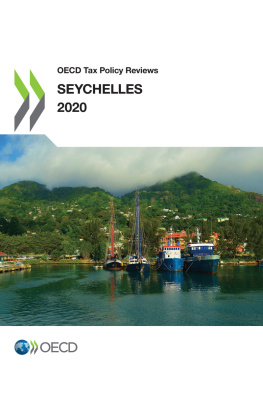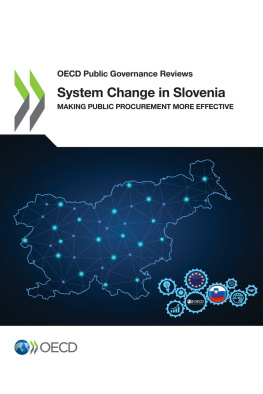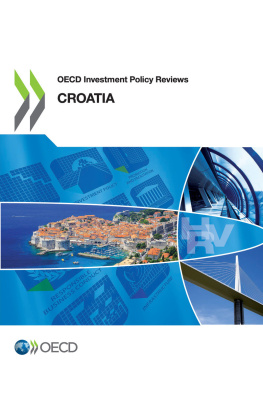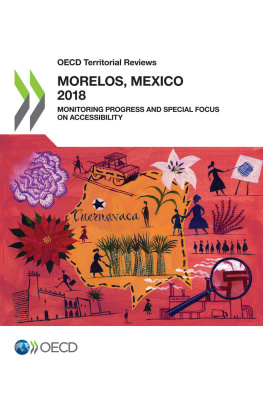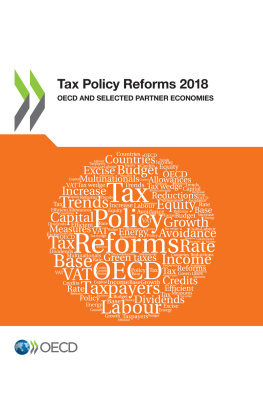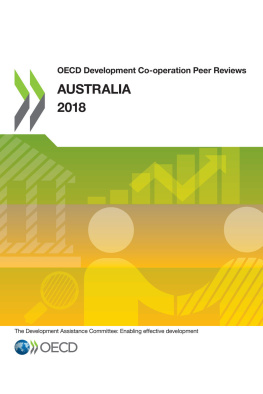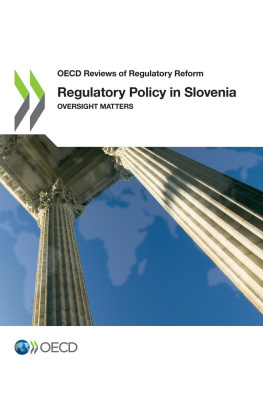coll. - OECD tax policy reviews Slovenia 2018
Here you can read online coll. - OECD tax policy reviews Slovenia 2018 full text of the book (entire story) in english for free. Download pdf and epub, get meaning, cover and reviews about this ebook. year: 2018, genre: Politics. Description of the work, (preface) as well as reviews are available. Best literature library LitArk.com created for fans of good reading and offers a wide selection of genres:
Romance novel
Science fiction
Adventure
Detective
Science
History
Home and family
Prose
Art
Politics
Computer
Non-fiction
Religion
Business
Children
Humor
Choose a favorite category and find really read worthwhile books. Enjoy immersion in the world of imagination, feel the emotions of the characters or learn something new for yourself, make an fascinating discovery.
OECD tax policy reviews Slovenia 2018: summary, description and annotation
We offer to read an annotation, description, summary or preface (depends on what the author of the book "OECD tax policy reviews Slovenia 2018" wrote himself). If you haven't found the necessary information about the book — write in the comments, we will try to find it.
OECD tax policy reviews Slovenia 2018 — read online for free the complete book (whole text) full work
Below is the text of the book, divided by pages. System saving the place of the last page read, allows you to conveniently read the book "OECD tax policy reviews Slovenia 2018" online for free, without having to search again every time where you left off. Put a bookmark, and you can go to the page where you finished reading at any time.
Font size:
Interval:
Bookmark:

OECD (2018), OECD Tax Policy Reviews: Slovenia 2018 , OECD Publishing, Paris.
https://doi.org/10.1787/9789264303898-en
This report provides a comprehensive tax policy assessment of the taxes paid by individuals in Slovenia and makes recommendations for tax reform. The report is divided into six chapters, starting with a general chapter which sets the scene for tax reform in Slovenia (Chapter 1) followed by a chapter on the labour market, social policy and tax policy related challenges (Chapter 2). The next chapters assess the financing of the social security system (Chapter 3) and identify strategies to strengthen the design of the personal income tax (Chapter 4), indirect taxes (Chapter 5), and the taxation of capital income at the individual level (Chapter 6). The main findings of the report are summarised in the executive summary and the main findings chapter; more detailed recommendations are included at the end of chapters 3 to 6.
This report is included in the OECD Tax Policy Reviews. OECD Tax Policy Reviews are intended to provide independent, comprehensive and comparative assessments of OECD member and non-member countries tax systems as well as concrete recommendations for tax policy reform. By identifying tailored tax policy reform options, the objective of the Reviews is to enhance the design of existing tax policies and to support the adoption of new reforms.
This report was written by Bert Brys, Cline Colin and Sen Kennedy and the project was led by Bert Brys. The analysis is primarily based on desk research, OECD statistics and tax modelling including an analysis based on microdata from individual taxpayers provided by the Ministry of Finance of Slovenia. The analysis of the microdata was carried out by Sen Kennedy. The value-added tax microsimulation analysis included in Chapter 5 was carried out by Alastair Thomas. The analysis benefited from a fact-finding mission which took place in Ljubljana in February 2018. During this mission, the OECD team spoke with a wide range of stakeholders and their valuable input is kindly acknowledged. The authors of the report would like to thank the Ministry of Finance of Slovenia for the assistance in organising the mission and for follow-up support in the drafting stage of the review.
The authors wish to thank Mateja Vraniar Erman, Minister of Finance of Slovenia, Tilen Boi, State Secretary and Irena Popovi, Director General of the Directorate for the System of Tax, Customs and Other Public Finance Revenues from the Ministry of Finance of Slovenia, as well as their teams who have provided valuable input and guidance. Thank you in particular to Meta inkovec from the Ministry of Finance and Avgustin Staric from the Financial Administration. Thank you also to Irena Sodin, Ambassador, Permanent Representative to the OECD. The authors wish to thank Sarah Perret, Dominique Paturot, Pierce OReilly, Alastair Thomas, David Bradbury and Pascal Saint-Amans from the OECD Centre for Tax Policy and Administration for their helpful suggestions and input. The authors are also thankful to Jens Hoj from the Slovenia desk in the Economics Department of the OECD and to Francesca Colombo, Head of the Health Division in the OECD Directorate of Employment, Labour and Social Affairs. Thank you also to Carrie Tyler for her guidance on communications.
Slovenia needs a comprehensive tax reform that rebalances the tax mix away from employee social security contributions (SSCs) towards personal income tax (PIT) and less distortive taxes such as value-added tax (VAT) and recurrent taxes on immovable property . The tax reform will have to prepare Slovenia for the ageing of its population. The reform should incentivise older workers to stay in the labour market longer and younger workers to enter the labour market sooner and should reduce unemployment, in particular of the low-skilled. In order to put the funding of the welfare system on a solid footing, without reducing entitlements to social benefits, the reform should partly shift the funding of the pension and health system from SSCs towards general taxation. The tax reform should be complemented with a broader set of reforms, including the pension and health care systems.
A comprehensive tax reform should be (at least) budget neutral and aligned with the countrys fiscal rule . Over the past two decades, Slovenia has undertaken a number of extensive reforms. Some of these reforms were not fully funded, resulting in significant budget deficits as high as one quarter of the current public debt of Slovenia. In recent years, the government has narrowed the budget deficit. The level of public debt has been falling since 2016, while the countrys highly redistributive tax and benefit system has been maintained. A comprehensive tax reform should therefore ensure that public debt can be further reduced.
The population in Slovenia is ageing rapidly with over 30% of people projected to be older than 65 by 2050, which will be one of the highest proportions in the OECD . The increase in age-related expenditure, especially on health and public pensions, will put pressure on the budget and require accompanying fiscal measures. In addition, population ageing will reduce PIT and SSC revenues, thereby exacerbating the challenges associated with financing the costs of ageing.
Older workers leave the labour market in Slovenia too early. While Slovenia is the top performer in the OECD with respect to the employment rate of workers in the prime age category of 25-54, for both men and women, it is one of the weakest performers with respect to the labour market participation of its workers who are older than 54. The 2013 pension reform increased the legal retirement age to 65 for both men and women, which has increased the number of workers in employment aged 55 and above. Nevertheless, tax return data for the year 2016 reveals that a significant gap remains between the official and the effective ages of retirement. Such a low rate of participation of older workers in the labour market is unsustainable in the context of Slovenias ageing population. Further efforts to continue increasing the effective retirement age are needed.
Font size:
Interval:
Bookmark:
Similar books «OECD tax policy reviews Slovenia 2018»
Look at similar books to OECD tax policy reviews Slovenia 2018. We have selected literature similar in name and meaning in the hope of providing readers with more options to find new, interesting, not yet read works.
Discussion, reviews of the book OECD tax policy reviews Slovenia 2018 and just readers' own opinions. Leave your comments, write what you think about the work, its meaning or the main characters. Specify what exactly you liked and what you didn't like, and why you think so.








